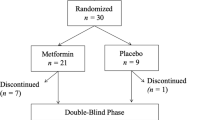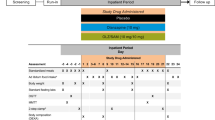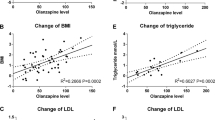Abstract
Several studies have shown increased rates of hyperglycemia and diabetes in schizophrenic patients treated with olanzapine. However, the underlying mechanism is poorly understood. Glucose-dependent insulinotropic polypeptide (GIP) is known to affect insulin secretion by pancreatic β cells. Recently, a meta-analysis study reported an association between a GIP receptor (GIPR) gene polymorphism (rs10423928) and insulin secretion measured by an oral glucose tolerance test (OGTT). We assessed the influence of this GIPR gene polymorphism on glucose metabolism in 60 schizophrenic patients treated with olanzapine and 103 healthy controls. The GIPR gene polymorphism was determined using TaqMan methods. We performed repeated-measures analysis of variance (ANOVA) and one-way ANOVA for the glucose and insulin levels during OGTTs in four groups divided by the GIPR gene polymorphism and cohort (schizophrenia or control). We found significant effects of the GIPR gene and cohort on the insulin levels at 30 min. Our findings suggest that schizophrenic patients with the A allele of GIPR rs10423928 are at risk of developing hyperinsulinemia when treated with antipsychotics.
This is a preview of subscription content, access via your institution
Access options
Subscribe to this journal
Receive 6 print issues and online access
$259.00 per year
only $43.17 per issue
Buy this article
- Purchase on Springer Link
- Instant access to full article PDF
Prices may be subject to local taxes which are calculated during checkout
Similar content being viewed by others
References
Harris EC, Barraclough B . Excess mortality of mental disorder. Br J Psychiatry 1998; 173: 11–53.
Dixon L, Weiden P, Delahanty J, Goldberg R, Postrado L, Lucksted A et al. Prevalence and correlates of diabetes in national schizophrenia samples. Schizophr Bull 2000; 26: 903–912.
McEvoy JP, Meyer JM, Goff DC, Nasrallah HA, Davis SA, Sullivan L et al. Prevalence of the metabolic syndrome in patients with schizophrenia: baseline results from the Clinical Antipsychotic Trials of Intervention Effectiveness (CATIE) Schizophrenia Trial and comparison with national estimates from NHANES III. Schizophr Res 2005; 80: 19–32.
Meyer JM, Stahl SM . The metabolic syndrome and schizophrenia. Acta Psychiatr Scand 2009; 119: 4–14.
Lieberman J, Stroup T, McEvoy J, Swartz M, Rosenheck R, Perkins D et al. Effectiveness of antipsychotic drugs in patients with chronic schizophrenia. N Engl J Med 2005; 353: 1209–1223.
Melkersson K, Dahl ML . Adverse metabolic effects associated with atypical antipsychotics—literature review and clinical implications. Drugs 2004; 64: 701–723.
Newcomer JW . Abnormalities of glucose metabolism associated with atypical antipsychotic drugs. J Clin Psychiatry 2004; 65: 36–46.
Newcomer JW . Second-generation (atypical) antipsychotics and metabolic effects—a comprehensive literature review. CNS Drugs 2005; 19: 1–93.
Newcomer JW, Haupt DW . The metabolic effects of antipsychotic medications. Can J Psychiatry Revue Canadienne De Psychiatrie 2006; 51: 480–491.
Buchanan RW, Kreyenbuhl J, Kelly DL, Noel JM, Boggs DL, Fischer BA et al. The 2009 schizophrenia PORT psychopharmacological treatment recommendations and summary statements. Schizophr Bull 2010; 36: 71–93.
Matthews DR, Hosker JP, Rudenski AS, Naylor BA, Treacher DF, Turner RC . Homeostasis model assessment—insulin resistance and beta-cell function from fasting plasma-glucose and insulin concentrations in man. Diabetologia 1985; 28: 412–419.
Newcomer JW, Haupt DW, Fucetola R, Melson AK, Schweiger JA, Cooper BP et al. Abnormalities in glucose regulation during antipsychotic treatment of schizophrenia. Arch Gen Psychiatry 2002; 59: 337–345.
Newcomer J, Ratner R, Eriksson J, Emsley R, Meulien D, Miller F et al. A 24-week, multicenter, open-label, randomized study to compare changes in glucose metabolism in patients with schizophrenia receiving treatment with olanzapine, quetiapine, or risperidone. J Clin Psychiatry 2009; 70: 487–499.
Yasui-Furukori N, Sato Y, Furukori H, Saito M, Nakagami T, Kaneko S . Glucose metabolism in Japanese schizophrenia patients treated with risperidone or olanzapine. J Clin Psychiatry 2009; 70: 95–100.
Hanssens L, van Winkel R, Wampers M, Van Eyck D, Scheen A, Reginster J et al. A cross-sectional evaluation of adiponectin plasma levels in patients with schizophrenia and schizoaffective disorder. Schizophr Res 2008; 106: 308–314.
Drucker DJ . The biology of incretin hormones. Cell Metabol 2006; 3: 153–165.
Holst JJ, Gromada J . Role of incretin hormones in the regulation of insulin secretion in diabetic and nondiabetic humans. Am J Physiol Endocrinol Metabol 2004; 287: E199–E206.
Saxena R, Hivert MF, Langenberg C, Tanaka T, Pankow JS, Vollenweider P et al. Genetic variation in GIPR influences the glucose and insulin responses to an oral glucose challenge. Nat Genet 2010; 42: 142–U175.
Min HK . Non-insulin-dependent diabetes mellitus (NIDDM) in Korea. Diabetic Med 1996; 13: S13–S15.
Fukui N, Suzuki Y, Sawamura K, Sugai T, Watanabe J, Inoue Y et al. Dose-dependent effects of the 3435 C>T genotype of ABCB1 gene on the steady-state plasma concentration of fluvoxamine in psychiatric patients. Ther Drug Monit 2007; 29: 185–189.
Vilsboll T, Krarup T, Sonne J, Madsbad S, Volund A, Juul AG et al. Incretin secretion in relation to meal size and body weight in healthy subjects and people with type 1 and type 2 diabetes mellitus. J Clin Endocrinol Metabol 2003; 88: 2706–2713.
Cohn TA, Remington G, Zipursky RB, Azad A, Connolly P, Wolever TMS . Insulin resistance and adiponectin levels in drug-free patients with schizophrenia: a preliminary report. Can J Psychiatry Revue Canadienne De Psychiatrie 2006; 51: 382–386.
Spelman LM, Walsh PI, Sharifi N, Collins P, Thakore JH . Impaired glucose tolerance in first-episode drug-naive patients with schizophrenia. Diabetic Med 2007; 24: 481–485.
Melkersson KI, Hulting AL, Brismar KE . Elevated levels of insulin, leptin, and blood lipids in olanzapine-treated patients with schizophrenia or related psychoses. J Clin Psychiatry 2000; 61: 742–749.
Melkersson K . Clozapine and olanzapine, but not conventional antipsychotics, increase insulin release in vitro. Eur Neuropsychopharmacol 2004; 14: 115–119.
Henderson DC, Cagliero E, Copeland PM, Borba CP, Evins E, Hayden D et al. Glucose metabolism in patients with schizophrenia treated with atypical antipsychotic agents: a frequently sampled intravenous glucose tolerance test and minimal model analysis. Arch Gen Psychiatry 2005; 62: 19–28.
van Winkel R, De Hert M, Wampers M, Van Eyck D, Hanssens L, Scheen A et al. Major changes in glucose metabolism, including new-onset diabetes, within 3 months after initiation of or switch to atypical antipsychotic medication in patients with schizophrenia and schizoaffective disorder. J Clin Psychiatry 2008; 69: 472–479.
Smith RC, Lindenmayer JP, Davis JM, Kelly E, Viviano TF, Cornwell J et al. Effects of olanzapine and risperidone on glucose metabolism and insulin sensitivity in chronic schizophrenic patients with long-term antipsychotic treatment: a randomized 5-month study. J Clin Psychiatry 2009; 70: 1501–1513.
Sondhi S, Castellano JM, Chong VZ, Rogoza RM, Skoblenick KJ, Dyck BA et al. CDNA array reveals increased expression of glucose-dependent insulinotropic polypeptide following chronic clozapine treatment: role in atypical antipsychotic drug-induced adverse metabolic effects. Pharmacogenomics J 2006; 6: 131–140.
Newcomer JW . Metabolic considerations in the use of antipsychotic medications: a review of recent evidence. J Clin Psychiatry 2007; 68: 20–27.
Eaton RP, Allen RC, Schade DS, Erickson KM, Standefer J . Prehepatic insulin production in man: kinetic analysis using peripheral connecting peptide behavior. J Clin Endocrinol Metab 1980; 51: 520–528.
Polonsky KS, Licinio-Paixao J, Given BD, Pugh W, Rue P, Galloway J et al. Use of biosynthetic human C-peptide in the measurement of insulin secretion rates in normal volunteers and type I diabetic patients. J Clin Invest 1986; 77: 98–105.
Sparacino G, Cobelli C . A stochastic deconvolution method to reconstruct insulin secretion rate after a glucose stimulus. IEEE Trans Biomed Eng 1996; 43: 512–529.
Acknowledgements
We thank Hiroshi Kusano and Nanako Yamazaki for their excellent technical assistance. This work was supported by a Health and Labour Sciences Research Grant (Research on Psychiatric and Neurological Diseases and Mental Health, H17-kokoro-002) to Dr Someya. This work was also supported by a Grant-in-Aid for Scientific Research (KAKENHI) (C) from the Japan Society for the Promotion of Research (JSPS, no. 20591362) to Dr Suzuki. The funding sources had no role in the study design, in the collection, analysis and interpretation of the data, in the writing of the report or in the decision to submit the paper for publication.
Author contributions
All the authors fulfill the criteria for authorship based on their substantial contribution to the conception and design, or analysis and interpretation of data; drafting the article or revising it critically for important intellectual content; or the final approval of the version to be published. No one who fulfils these criteria has been excluded as an author. Dr Toshiyuki Someya is the guarantor for the present manuscript; he accepts full responsibility for the finished article, because he had access to all the data and controlled the decision to submit for publication.
Author information
Authors and Affiliations
Corresponding author
Ethics declarations
Competing interests
The authors declare no conflict of interest.
Rights and permissions
About this article
Cite this article
Ono, S., Suzuki, Y., Fukui, N. et al. Association between the GIPR gene and the insulin level after glucose loading in schizophrenia patients treated with olanzapine. Pharmacogenomics J 12, 507–512 (2012). https://doi.org/10.1038/tpj.2011.28
Received:
Revised:
Accepted:
Published:
Issue Date:
DOI: https://doi.org/10.1038/tpj.2011.28
Keywords
This article is cited by
-
Association of gastric inhibitory polypeptide receptor (GIPR) gene polymorphism with type 2 diabetes mellitus in iranian patients
BMC Medical Genomics (2023)
-
Drug-induced hyperglycaemia and diabetes: pharmacogenomics perspectives
Archives of Pharmacal Research (2018)



